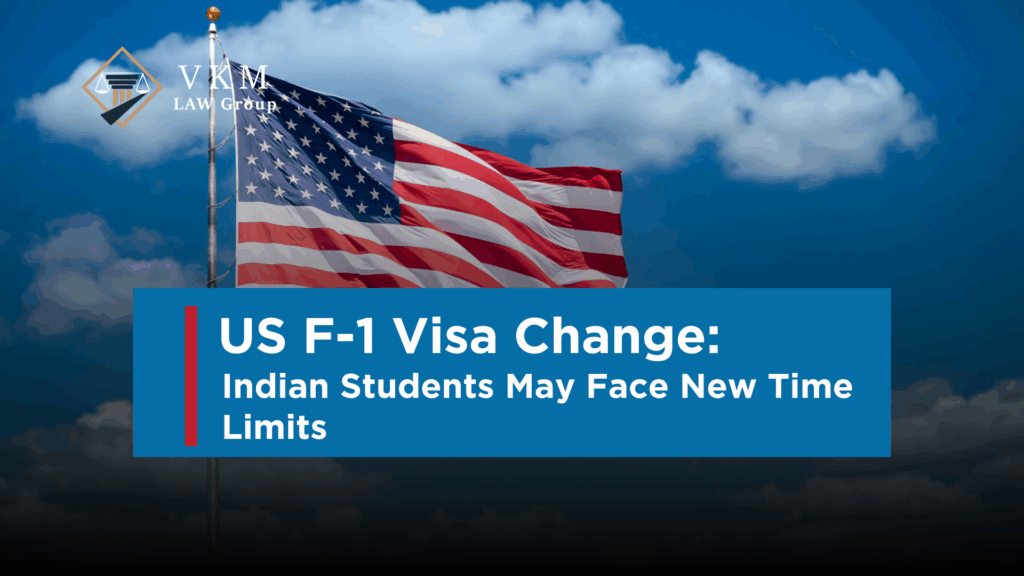
If you’re an international student aiming for study in the U.S., there are important changes proposed that could affect your plans. As your visa/immigration counsel, VKM is keeping a close eye on these developments. Here’s a breakdown — and how to navigate them.
What’s Changing
- Fixed Maximum Duration
The U.S. Department of Homeland Security (DHS) has proposed replacing the existing “Duration of Status” rule for F-1 student visas with a fixed 4-year cap. That means, under the new regulation, your visa would expire after four years, no matter how long your program is supposed to take. - End of “Flexible Stay Until Program End”
Under the current system, as long as you comply with visa conditions (maintaining full enrollment, making progress, etc.), you can stay in the U.S. until you finish your program. That includes graduate studies or research that might exceed four years. That flexibility may disappear under the proposed system. - Requirement to Apply for Extensions
If you’re in a program that takes longer than four years (think Ph.D., professional degrees, or if there are delays), you may need to request extensions through U.S. Citizenship and Immigration Services (USCIS). These will demand justification, paperwork, and waiting — possibly with financial, time, or emotional cost.
What This Means in Practice
- Programs at Risk
Advanced degrees, research-heavy programs, medical residencies, or anything that often runs beyond four years will be under strain. Even small delays — health matters, changes in research scope, external interruptions — might push you past the fixed limit. - More Bureaucracy, More Pressure
Extensions won’t be automatic. You’ll have to build a case for why your studies exceeded four years. That means more administrative work, possibly higher costs, and risk if an extension is denied. - University & Institutional Adjustments
Universities will need to adapt their advising and compliance systems. They’ll have to support international students to navigate the new rules, plan ahead for possible delays, and ensure documentation is strong. - Potential Emotional & Financial Stress
The uncertainty of whether you’ll need an extension (and whether it will be granted) may cause stress. Additional legal fees or other expenses could also be a burden. Planning becomes more critical.
Why DHS is Proposing This
- Stronger Oversight
The DHS claims that replacing the “duration of status” with a fixed period will improve monitoring and accountability — ensuring that students remain compliant with visa conditions over a known period. - Preventing Misuse
One concern is that some visa holders might overstay or drift off course academically. The proposal aims to reduce that risk by limiting how long someone can stay before needing formal review.
What You Can & Should Do
Since these changes are still proposed, nothing has changed yet. But as your immigration attorneys, VKM recommends the following actions now:
- Stay Informed
Keep track of official DHS publications and USCIS notices. These rules might change in wording or implementation. Early knowledge gives you more options. - Choose Programs Strategically
If you’re selecting your degree program, think about how long it will realistically take. Are there likely delays? Can your area of study finish within 4 years? If not, plan for contingency. - Maintain Strong Records
Documentation (academic progress, medical issues, research delays) could be crucial if you apply for extensions. Maintain up-to-date transcripts, advisor statements, etc. - Legal & Academic Advising Team
Engage your institution’s international student office or legal counsel (like VKM) early. They can help you understand what’s needed and help you build a case if an extension is required. - Financial Planning
Budget for possible extension costs — extra semesters, additional fees, travel restrictions, etc. - Consider Back-up Plans
Other visa options, alternate study paths, or transferring credits might be useful if delays make finishing under the 4-year cap difficult.
What VKM’s Clients Are Doing
Several of our students/clients are already:
- Opting for programs with clearer timelines, fewer likely disruptions (lab work, research, clinical rotations).
- Starting paperwork early so that if delays arise, applications for extension have stronger evidence.
- Keeping communication open with their advisors and universities to document progress.
Final Thoughts
These proposed changes, if enacted, could significantly impact many international students — introducing more constraints, more review, and more risk of disruption. But with early planning, good documentation, and strategic decisions, many of these risks can be managed.
At VKM, our goal is to guide you through immigration transitions smoothly — ensuring you are prepared no matter how rules evolve.